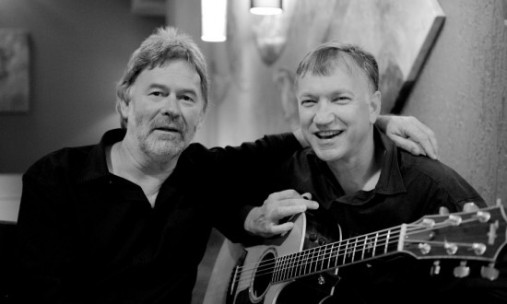
By Warwick McFadyen
Some days, out of the blue, a star will fall from the sky and land at your feet. You’ll look at the crater before you. The star will be there no more, just the space it’s gouged out of the earth, and you’ll look to the sky and see a tear in the blue marking its path. Such a star fell this morning.
The name of the star was Hugh McDonald. Unlike the brittle lights in the galaxy of celebrity, McDonald was part of the oft-neglected, unknown, scarcely remarked upon choir of voices that sing of country, of character, of the essence that creates the entity that is Australian.
McDonald’s death from cancer, aged only 62, feels like a death in the family. I didn’t know him. I have over the course of the years interviewed his friend and musical partner John Schumann, and yet this news has set off a mourning such as a tuning fork within might resonate to waves of tragedy. I can only put this down to the power of the song. When words and music enter your mind and body, if they strike a chord, they become part of you. Sometimes quiet residents, sometimes not. Hugh McDonald’s work lived, lives, within me. For that I am thankful.
On news of his friend’s death, John Schumann posted this: “Most people will know by now that my dear dear mate, music accomplice, wingman and backstop for more than half my life, Hugh McDonald, died last night after a long, courageous and inspirational battle with cancer. You get a mate like Hugh once in a lifetime – if you’re lucky. I was blessed – we all were. More later when my screen doesn’t look like a fish shop window from the 1950s.”
 The pair came together in Redgum, and perhaps more than any other band, they sang of Australia, its soil and soul, its life in the cities and in the outback, its history, its politics. They were, out of laziness by some labelled a protest group, but their ethos ran deeper than that. They dug into the cultural and political and held up to the light the stones most would have preferred buried. Their first album was called If You Don’t Fight You Lose. It was a marker, from which they expanded with subsequent albums. They questioned. They were not afraid to sing out. They were a breath of fresh air.
The pair came together in Redgum, and perhaps more than any other band, they sang of Australia, its soil and soul, its life in the cities and in the outback, its history, its politics. They were, out of laziness by some labelled a protest group, but their ethos ran deeper than that. They dug into the cultural and political and held up to the light the stones most would have preferred buried. Their first album was called If You Don’t Fight You Lose. It was a marker, from which they expanded with subsequent albums. They questioned. They were not afraid to sing out. They were a breath of fresh air.
They had their greatest success with I Was Only 19 (A walk in the Light Green) in 1983. It went to No.1 and had a profound effect on how this country saw its Vietnam War veterans. Schumann and McDonald continued their associations with Australia’s armed forces, performing and in helping veterans after the war is over. Schumann left in the late 1980s and the band ceased in 1990, but the pair reunited in the Vagabond Crew and in later years performed together. McDonald released several solo albums, had a recording studio in Melbourne and taught music. One of the albums was The Lawson Album, based on the works of Henry Lawson. (Schumann did similarly.)
If I had to play songs to people overseas songs that contained a meaning of being Australian, McDonald’s Diamantina Drover would be one. It carries within its words and landscape of melody and harmony, an evocation that is both singular and universal. It has a rough, loveworn feel to it. It has the wide horizon and the close emotions that shape us. It is a thing of beauty.
So a star fell this morning, and as I type I’m listening to this:
For the rain never falls on the dusty Diamantina
And a drover finds it hard to change his mind.
Thanks Hugh.
CODA: A selection of versions of Diamantina Drover, from Redgum, Nancy Kerr and James Fagan, John Schumann and Hugh McDonald, and Christy Moore, with Enya on backing vocals.
https://www.youtube.com/watch?v=DeLfmrnIjBs
https://www.youtube.com/watch?v=FAULK-QJzJE
https://www.youtube.com/watch?v=GoWJWEr7DO4
https://www.youtube.com/watch?v=jejtvP_pwCk.
Warwick McFadyen is a freelance writer and editor
Thank you, Warwick, for your beautifully written in memorium of a special soul who’s art has touched many people. RIP Hugh McDonald.
LikeLike
He was a class act. Sadly missed .
LikeLike
so sad to hear; I performed Diamantina Drover for decades as a smaller-scale entertainer (as in lower profile). I had the great joy and privilege of meeting Hugh at Port Fairy one year and got his kind feedback; I recall him being gratified that I (like so FEW artists) had picked up the final change in the chorus which says in final turn, I won’t be back WHEN the drovin’s done … as against “TILL”.
For me this was a very important song and always will be; expressing such deep feeling.
I performed it when I was stage-warmer for Foster and Allen and literally stole the show at that point … they loved it and embraced me backstage later.
Tx Hugh (and John) for so much that you gave to me in my young life, which remains a treasure to this day.
LikeLike